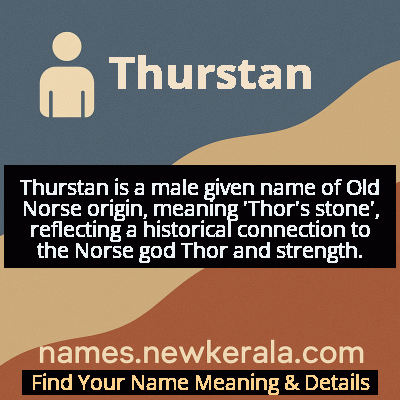Thurstan Name Meaning & Details
Origin, Popularity, Numerology Analysis & Name Meaning of Thurstan
Discover the origin, meaning, and cultural significance of the name THURSTAN. Delve into its historical roots and explore the lasting impact it has had on communities and traditions.
Name
Thurstan
Gender
Male
Origin
Christian
Lucky Number
4
Meaning of the Name - Thurstan
Thurstan is a male given name of Old Norse origin, meaning 'Thor's stone', reflecting a historical connection to the Norse god Thor and strength.
Thurstan - Complete Numerology Analysis
Your Numerology Number
Based on Pythagorean Numerology System
Ruling Planet
Uranus (Rahu)
Positive Nature
Strong sense of order, loyal, practical, and disciplined.
Negative Traits
Stubborn, overly serious, rigid, and prone to feeling restricted.
Lucky Colours
Blue, gray.
Lucky Days
Saturday.
Lucky Stones
Blue sapphire.
Harmony Numbers
1, 7, 8.
Best Suited Professions
Managers, engineers, accountants, organizers.
What People Like About You
Dependability, discipline, practicality.
Famous People Named Thurstan
Thurstan of Bayeux
Archbishop
Led English forces to victory at the Battle of the Standard in 1138 and reformed the English church
Thurstan Holland
Film Director
Pioneering British documentary filmmaker who captured significant historical events in early 20th century
Thurstan Shaw
Archaeologist
Revolutionized understanding of West African prehistory through extensive excavations and research
Thurstan Bass
Musician
Influential jazz bassist who contributed to the development of West Coast jazz style
Name Variations & International Equivalents
Click on blue names to explore their detailed meanings. Gray names with will be available soon.
Cultural & Historical Significance
Extended Personality Analysis
Individuals named Thurstan typically exhibit a compelling blend of strength and stability, perfectly reflecting their name's meaning of 'Thor's stone.' They often demonstrate natural leadership qualities combined with practical wisdom, making them effective in positions of responsibility. The Thor element suggests they possess dynamic energy, courage, and the ability to take decisive action when necessary - much like the Norse god's legendary hammer strikes. Meanwhile, the stone component indicates reliability, loyalty, and emotional steadiness. Thurstan's tend to be the rocks in their social and professional circles, providing consistent support during turbulent times. They often balance traditional values with innovative thinking, creating a unique personality profile that respects heritage while embracing progress. Their communication style is typically direct yet thoughtful, and they excel in situations requiring both bold initiative and patient endurance. Friends and colleagues value Thurstan's for their unwavering dependability and their capacity to tackle challenges with both force and finesse. This combination of thunderous energy and stone-like permanence makes them particularly effective in careers requiring both visionary leadership and meticulous execution.
Modern Usage & Popularity
In contemporary naming practices, Thurstan maintains a distinctive presence as an uncommon but meaningful choice that appeals to parents seeking names with historical depth and unique character. While it has never achieved widespread popularity in modern times, it enjoys periodic revivals, particularly among families with Scandinavian heritage or those interested in medieval history. The name's usage is most consistent in England, especially in regions with strong Viking historical connections like Yorkshire and Northumbria. Modern parents who choose Thurstan often appreciate its powerful etymology, distinctive sound that stands out without being overly eccentric, and the appealing combination of strength and stability it represents. Current naming trends show increased interest in historical names with strong meanings, which has brought renewed attention to Thurstan among parents looking beyond top-100 lists. The name's rarity ensures it remains distinctive while its historical significance provides substantial naming substance. It's particularly favored by families valuing cultural continuity and those seeking names that balance traditional roots with unique contemporary appeal.
Symbolic & Spiritual Meanings
The name Thurstan carries profound symbolic weight through its constituent elements, creating a rich tapestry of metaphorical meaning. The 'Thor' component symbolizes divine power, protection, and transformative energy - representing the ability to create change through decisive action, much like thunder and lightning reshape the landscape. This aspect suggests leadership, courage, and the capacity to overcome obstacles through force of will. The 'stone' element symbolizes permanence, foundation, and reliability - representing the unchanging principles and steadfast character that provide stability in turbulent times. Together, these elements create a powerful symbolic balance between dynamic action and enduring stability. Thurstan metaphorically represents the ideal of being both the force that drives change and the foundation that ensures continuity. This duality makes the name symbolically potent for representing individuals who can initiate transformation while maintaining core values, who combine innovative vision with traditional wisdom, and who provide both the energy to move forward and the stability to ensure lasting progress. The name thus becomes a symbolic representation of balanced leadership and grounded strength.

